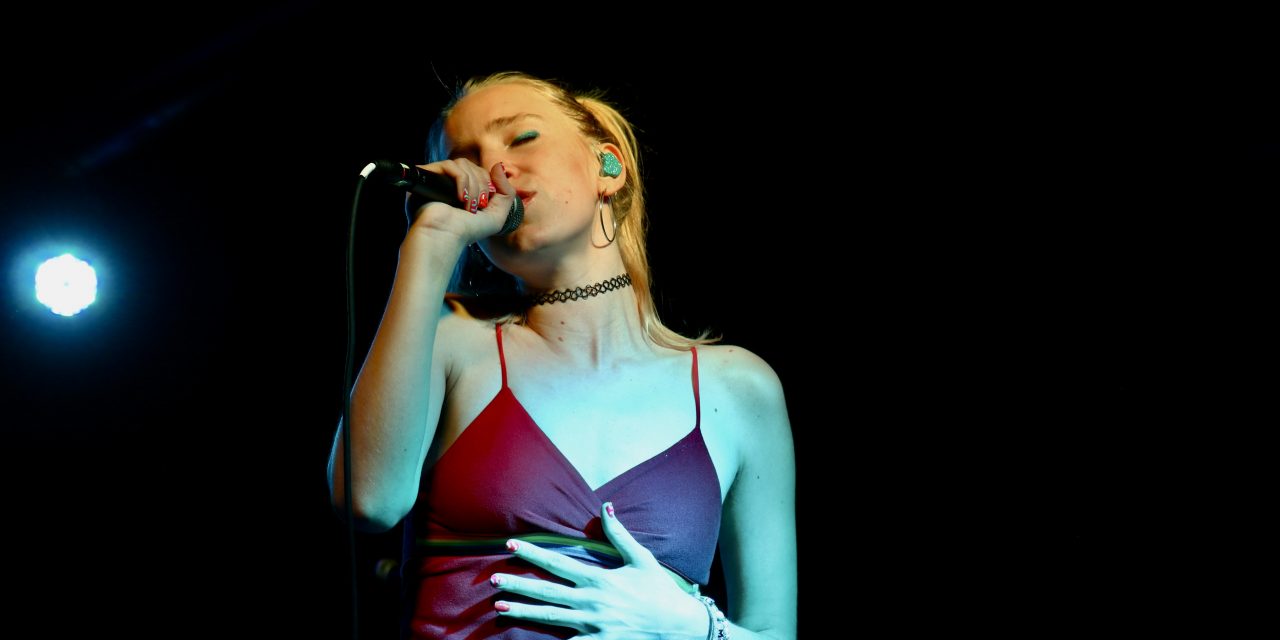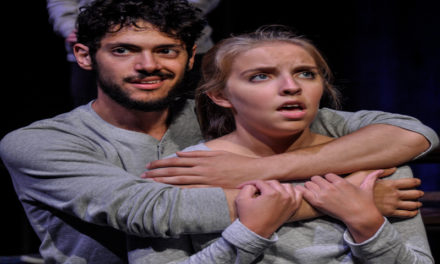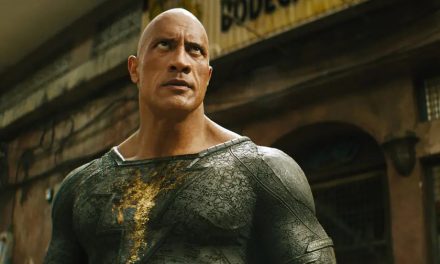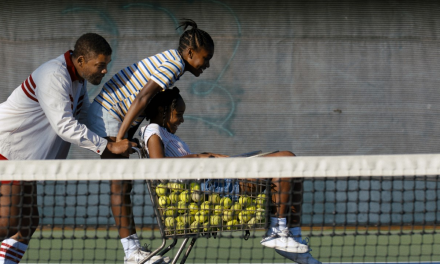Friends are underappreciated — at least, in Maude Latour’s opinion.
The New York singer’s discography offers a fresh perspective on love — the platonic, the romantic, the romantically platonic — that emerges at a moment when love, in all its forms, needs a revolution.
Latour traveled south for the final weekend of her debut tour, which spanned 13 U.S. cities. She played her first ever southern show at Vinyl in Atlanta on April 22.
The line outside the Midtown venue stretched to the edge of the block. Above it, the marquee sign glinted in the evening sun: “Maude Latour — Sold Out.”
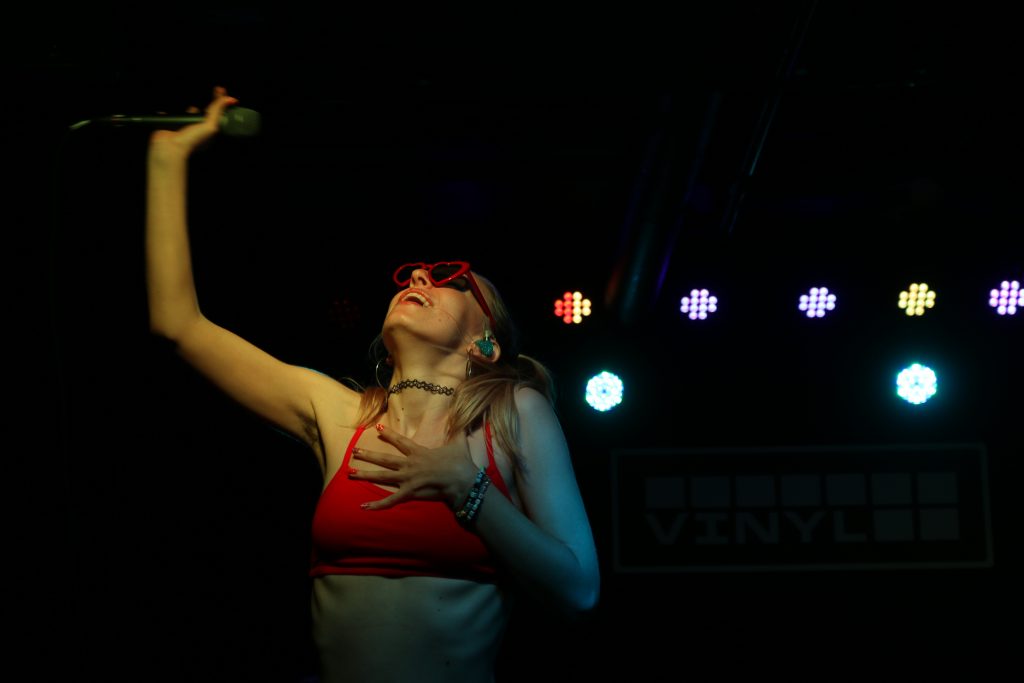
Maude Latour performed at the Vinyl Theatre in Atlanta on April 22. She will perform at Lollapalooza in July and the All Things Go Music Festival in October. (Oli Turner)
Two college students in colorful denim told me they drove from Jacksonville, Fla. to see Latour’s closest show, joining many other day-one supporters crowding the sidewalk.
Before the concert, I sat down with Latour on one of Vinyl’s leather couches while the opening act, Syd Burnham Band, did a soundcheck. The floor would soon be packed after the doors opened at 7 p.m., but until then, we sat in the potential of the show, the space yet to be filled, to discuss Latour’s first tour.
“I was worried it was going to be just stressful, but it’s actually great,” Latour told me, lounging in a slouchy purple hoodie and oval sunglasses.
The singer-songwriter is in a transition period. Latour will graduate from Columbia University in May and pursue her music career full-time.
“One day, I’ll put out an album,” she said. “I get my whole brain space to think about that.”
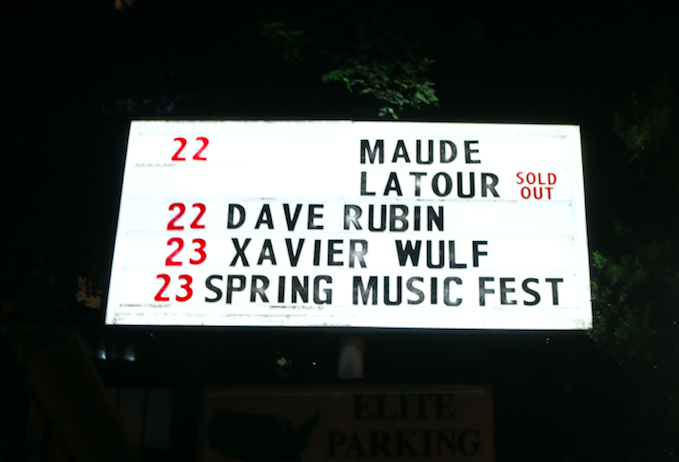
The Vinyl Theatre sign on April 22 read “Made Latour — sold out.” (Oli Turner)
Latour’s career is just beginning. Over the course of the COVID-19 pandemic, her following surged as she posted her music on social media.
Latour sold 47 tickets to her last show before the pandemic began. Now, her shows sell out.
She said she is working to create the perfect soundtrack for the magic of life.
“I hope my songs make you feel … powerful and larger than life, like containing the universe and cosmic,” Latour said.
Additionally, she said she has a message for her college-aged fans.
“Put your phone away at night,” Latour said. “Don’t get too hung up on any heartbreak. You can forgive them. You can move on.”
Inspired by intense emotion, Latour said that she uses her music to “remember” and “capture” the world around her. “I get to point to something I believe in and … make it stay forever,” Latour said. “I try to keep an eye out to look for sacred things.”
Among the things sacred to Latour is friendship. Her songs “Lola,” “Starsick” and “Walk Backwards” center on platonic love.
“I really feel like my friendships are my fingerprints on the world,” Latour said. “They’re frequently confusing, blurry.”
While most pop music praises romantic partners, Latour’s songs about friendship have garnered a passionate listenership.
Emotional tracks pervade Latour’s discography, rarely ever melancholy, but upbeat and cathartic. Think of screaming something devastating into the sky, crying tears of joy, feeling the sweeping relief of leaving nothing unsaid.
“I try to help people be ‘sick of small talk’ and … say what’s going on in their head,” Latour said. “I think we should share our feelings with the people around us.”
“Sick of small talk” is a lyric from her song “Superfruit,” one of the first tracks Latour said encapsulated her sound as a musician.
In 2018, Latour released an EP called “High School High,” which was deleted from all streaming platforms in 2020. I asked her about the missing songs, one of which still appears on the list of my all-time most-streamed songs on Spotify.
“I took them down because it was my first time putting a world out there, and I was only just starting to understand who I was,” Latour said. “[‘Superfruit’ and ‘Starsick’] really so clearly felt like the beginning, so the people around me advised me to take the other ones down.”
Although the EP no longer fits into Latour’s world, she hasn’t forgotten it.
“I would love to find a way for people to listen to them again,” she said.
But right now, Latour isn’t looking back. She’s slated to perform at Lollapalooza in July and the All Things Go Music Festival in October.
Her next move: another EP, which she said she will begin writing soon.
“I see it in my head, but it’s not ready,” Latour said.
The vision for her existing discography came to fruition in the evening’s show. Latour’s performance distilled all the energy in the universe inside the Vinyl — speakers bursting, hands reaching, the crowd one glittering unit at her feet.
Onstage, Latour was an incredible presence. She spent most of the show on the frontmost edge of the stage, just inches away from the front row of the crowd.
Latour’s rhinestone jeans shimmered under the stage lights, and her blue eyeliner matched a sparkling blue earpiece. She wore her hair in long pigtails, a red tank top with a rainbow detail, hoop earrings and a choker.
“We’ll have our own revolution, baby,” Latour sang, bounding across the stage during “Starsick” with outstretched arms.
The notion that intense feelings can be celebrated, not denigrated, is itself a revolution.
“It’s important to me that my songs remind you to drink your water, make your bed, take care of yourself,” Latour told the crowd before launching into “Clean,” a song about self-love after a breakup.
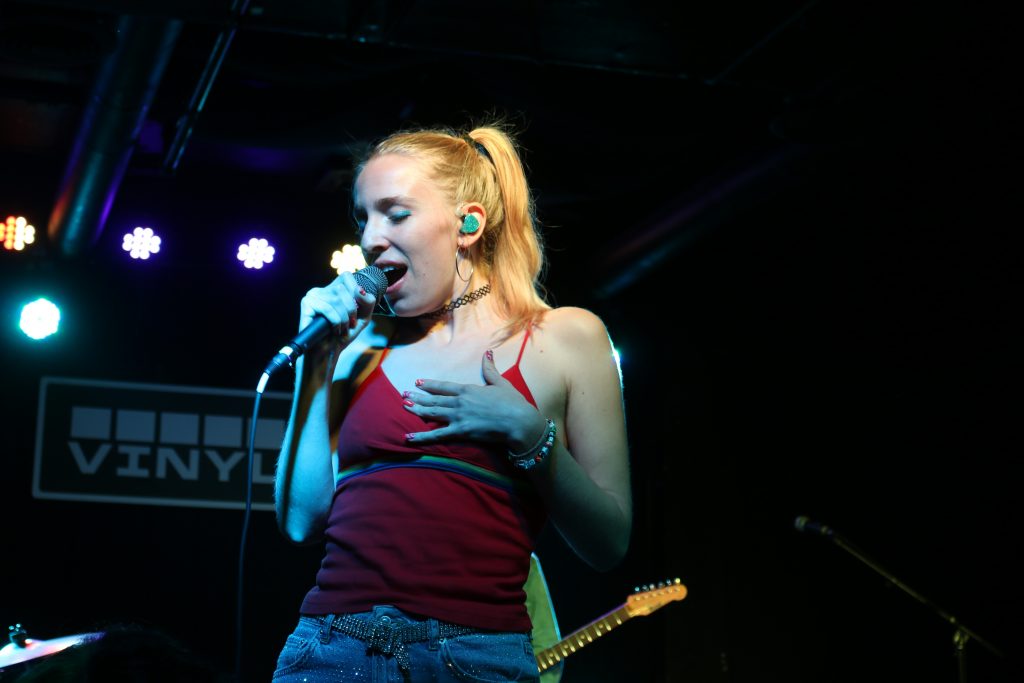
Maude Latour released her first EP, “High School High,” which has since been deleted from streaming platforms. Since then, she has released two albums and two singles.(Oli Turner)
The audience knew every word to each of the 15 songs Latour sang that night — even “Lola,” a single released April 8, a mere two weeks before the show.
The energy in Vinyl marked the dawn of an undeniable Maude-mania. I pondered the physics of kinetic and potential, the snowballing of something already in motion, the exponential forward-launching in the crowd’s reaching hands.
Latour paused between songs, asking for complete silence to lead the amped-up audience through three deep breaths. On the exhale of the third, the opening notes of “Ride My Bike” blasted through the speakers. A smile spread across Latour’s face as the crowd screamed to life.
She stepped back to the keyboard to perform a nostalgic rendition of “Shoot and Run,” a song she released for a school project as a high school senior that began her music career. The track showcases her deep, smooth vocals, which sounded clear and powerful in front of a live audience.
Latour took a break in her set to marvel at Atlanta’s spring foliage, far leafier than Manhattan’s trees in April. She then introduced her unreleased song, “Trees,” to the screaming crowd.
“And suddenly the trees are breathing like my lungs are too / And it feels surreal that I’m forever changed by you,” Latour sang.
Her style is unmistakable, her lyrics distinctly profound. As the melody unfolded, I imagined a canopy of old Georgia trees swaying outside, their branches outstretched, life flowing through trunks and forests like it flows through each of us. Cosmic.
Oli Turner (she/her) is from Manchester, Massachusetts, majoring in English & Creative Writing and minoring in Rhetoric, Writing, & Information Design. Her work has appeared in Atlanta Magazine, Boston Hassle, and the Manchester Cricket. She co-hosts the Wheel's arts & entertainment podcast, Clifton Culture, which spotlights student artists at Emory. Outside of the Wheel, she serves as Vice President of WMRE, Emory's student-run radio station. When she's not writing, editing, or DJ-ing, you can find her at the nearest DIY show scoping out local live music.

